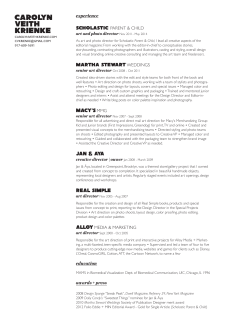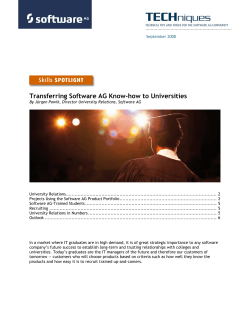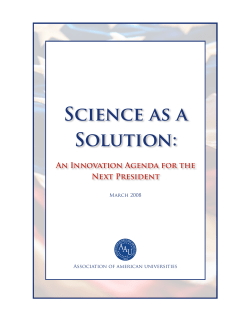
March 5, 2014 No. 321 English Edition No.62
Address ┃ 40 Kangnamro, Giheung-gu, Yongin-si, Gyeonggi-do English Edition No.62 Publisher : Yoon Shin-il•Executive Editor : Choi Jong-hyuk•Editor-in-chief : Hong You-jung •English Editor : Charles Ian Chun Learning how to live somewhere new By SALTANAT AKHMETOVA What is it like being in a country totally different from yours? What kinds of hardships do foreigners usually face? International students at Kangnam University know how it goes. But what about the other way round? Lena Kim is a Korean student who has been living in the USA for about six months. The Kangnam Hakbo asked her about her experiences. How did you feel when you landed in the United States? When I got to the United States, it was like a dream -- a dream that finally came true. I felt a little scared but also excited. It's your first long trip abroad. Where do you live? What difficulties did you face at first? At first I lived in San Diego, which has a poor That's right. I did many things, but there were a lot of difficulties. I'm getting through it. I feel like I'm finally learning how to live here. What's it like in San Diego compared to other places? San Diego is a totally "free" city because the weather is nice and most of the residents are already retired. Plus a lot of them are wealthy and happy; USA CONT. ON 4 One journey ends. Another begins. PHOTO: CHARLES IAN CHUN By HAN SOL E Kangnam University held its graduation ceremony the morning of February 20 in Mokyang Hall. The KNU campus was crowded with families and friends who came to congratulate the Time is a mirror of our future public transportation system. It made me really miss Korea's. Because getting around was so inconvenient, I had to get a driver's license and buy a car. Now I live in San Francisco, which is so nice. But no place is better than Korea! It seems you had to learn something new to adapt to a new place. roughly 1,420 graduates. "It still hasn't sunk in," said one graduate, positively beaming with pleasure. "My life as a student is completely over, but my new one has started. It's awesome!" March 5, 2014 No. 321 By ALMAGUL MAGAMBETOVA Editor's note: The following is Part 1 of 4 of a series that looks at how Kangnam University's students are pursuing their dreams. ▲ Kangnam University president Shinil Yoon delivers his New Year’s address in Wooweon Hall. Message from the President Dear all faculty and staff at Kangnam University, The new year will be full of expectations and high hopes for a brighter future. Kangnam University has stood the test of time boasting 68 years of history which have included many challenges all overcome by the grace of God. I would like to wish you all a Happy New Year filled with good health and prosperity. Amid many obstacles and challenges, our university has made remarkable strides in many areas. We have achieved many of our goals by being recognized as an accreditation institution for university evaluation, selected for the Educational Capacity Enhancement Project, and recognized as the university with the best educational conditions for students with disabilities. However, we have also experienced failures in the following areas such as the University Empowerment P roj e ct, t he L e ad i n g University in Advanced Undergraduate Education Project, along with national projects which include the Leading University for Fostering and Supporting International Collaboration Project. Despite these failures, we received the award for Best Admissions Office Support Project and were recognized as a university with a strong continuing education program. Universities are currently faced with the challenge of overcoming a sharp decrease in the collegeage population. At this rate over 50 universities may close down within 10 years, and the number of universities may shrink to half the current size in 20 years. The Ministry of Education has decided to close down universities deemed insolvent based on their policy of enhancing c o mp e t it ive n e s s a n d increasing the quality of education in addition to reducing the enrollment quota and implementing specialized programs leading to large-scale reductions in the enrollment quota nation-wide. Amid this situation, it is fair to say that the future of our university is a bleak one. Then how are we to deal with this situation? If we are unable to prepare for changes, it will bring about stagnant educational growth as well NEW YEAR CONT. ON 2 Investment is one of the most valuable ways to earn future income. Whether it is financial investment such as putting our money in assets or economic investment in factories, machinery, and goods, there is an expectation of further income -- a return. How about the investment of our time? All of us have the same 24 hours (1,440 minutes or 86,400 seconds) each day to manage, and we expect a return on that, too. Students spend their time, however, in different ways. Some enjoy their twenties airily reaxing with friends. Others work at a part-time job, thankful for TIME CONT. ON 3 The English Hakbo is online! englishhakbo.chaekjang.com March 5, 2014 No. 321 NEW YEAR FROM 1 as financial detriment eventually leading to insolvency. Now is the time to prepare for imminent changes in a strategic and systematic way, so that it will lead to specialization and continuous development. In order to survive, universities must accept innovation suited to the spirit of the times, and we are no exception. All of us here at KNU must come together and support one another to realize our goals of innovation and positive change. As president, I would like to take this time to outline some of our tasks at hand. First, our goal is to become a strong university through specialized programs. Efforts must be made to increase the competitiveness of our university through a l l o c at i n g r e s ou rc e s and fostering selected educational programs and academic disciplines. In order to do this, we plan on implementing specialization and restructuring. Through the integration of departments, closures, and restructuring/ reductions in quota, we will make every effort to improve specialization and educational conditions. We will encourage specialization across disciplines and c r e at e a s y s t e m fo r educational advancement and development. Second, we will foster talented individuals who will make a difference in their communities by providing quality education. One of the main goals of university education is to provide creative and innovative learning, thereby fostering students who will have a deeper understanding of the world around them. In order to do this, we have made dual and specialized degrees mandatory and adopted the graduation certification system. We will continue to establish an educational system that is uniquely our own, fostering talented and outstanding individuals who will make a difference in their communities. We will build a more systematic academic curriculum and go ahead with our plans of restructuring undergraduate studies enabling the integration of academic disciplines. Third, we will establish K N U a s t h e le a d i n g university in globalization. We are living in an age of globalization and part of the human community, which is why we have to foster individuals that will fit the "global standard". Our university has established ties with other universities as sister university to 137 universities in 35 countries. We have extended our ties to universities located in China, North America, S o u t h A m e r i c a, a n d Southeast Asia, and are expanding our overseas educational support projects in countries in Africa such as Uganda and Kenya. We will continue our efforts to globalize our university in a variety of ways in many parts of the world. Fourth, we will achieve our goal of administrative specialization that will contribute to the enhancement of education and research as well as competitiveness. Due to the diversity of roles played by the university, it is clear how important it is to improve the quality of administrative t a s k s. Ju s t a s it i s important to improve the quality of education and research, it is also essential to pursue specialization in the area of administration. Based on the establishment of strategy, execution, reduction of costs and communication, we will increase administrative efficiency. The administrative performance evaluation is in its trial run phase at the moment, and through the restructuring of the administrative system and performance annual salary system we will achieve our goal of administrative advancement and specialization. Fifth, we will do our best to establish a systematic budget management and budget deficit management system. Through a systematic management of our budget and efficient management, our university has established a solid financial structure over the years. However, due to the halftuition issue we have lowered our tuition fees, leading to added pressures on our budget and financial management caused by a demand in scholarships and reductions in enrollment. Last year, we were forced to operate under a tight budget and had to make major budget cuts. In order to solve this problem, we plan on establishing a budget deficit management system through effective distribution of resources and expansion of scaleup financing. We need to actively raise funds for university development and discover talented individuals who will represent our university and at the same time achieve a budget deficit management system through fairness and justice in budget management and effective distribution of resources. Finally, we will pursue our plans of academic affairs management and policy projects that will instill faith and trust in our students. We must continuously communicate with our students so that we will satisfy their needs in every way. It is essential for universities to adapt to the changing needs of the students leading to proactive evolution. We need to change and innovate from the NEW YEAR CONT. ON 3 PHOTO: HAN SOL E ▲ Students enjoy the festivities at Kangnam University’s Freshman Orientation week Taking that first step By HAN SOL E About 1,500 freshmen and 800 students attended Kangnam University's Freshman Orientation (OT) week February 24-26 at Pyeongchang Hanhwa Resort. Over three days and two nights, new students learned about how things are done at Kangnam University while making friends and enjoying the festivities. Student clubs were on hand welcome the incoming students and recruit new members. A surprise special appearance was made by hip-hop artists Bumkey and Defconn. Three days and two nights went by fast, but KNU's new students are sure to remember this impressive start for a long time to come. Hyeri Song wins Mozart competition at Gonjiam PHOTO COURTESY OF PHILIPP JUNDT ▲ Hyeri Song performing as soloist at the Gonjiam Music Festival’s gala concert. By CHARLES IAN CHUN 4t h-ye a r G e r m a n School of Music Weimar flute student Hyeri Song distinguished herself last month by winning the Mozart competition at the Gonjiam Music Festival. Out of forty flutists, Song was chosen unanimously by the five judges as the best player of the festival. She won the judges over with "her warm and full tone, along with her brilliant and clean technique," explained her professor Philipp Jundt adding, "Her natural, yet strong character on stage especially impressed all the professors." As winner, Song was given the honor of performing as soloist with the festival's flute orchestra, playing Mozart's Flute Concerto in G major at the festival's gala concert. March 5, 2014 No. 321 Editorial NEW YEAR FROM 2 Communication: Vital for life March is a month that brings in the new academic year making it even more special. Although we can still feel the cold winter air, it will actually prepare us for what lies ahead in the new semester. However, March will leave us with a heavy heart as we will feel deeply saddened because of what happened on the night of February 17. The whole nation was overcome with grief after witnessing the tragedy of that day, as if the victims were our own children, grandchildren, brothers, and sisters. This winter was an especially cruel winter due to the exceptional amount of snowfall. This tragic accident made us realize how snow piled up on a roof can turn into a ticking time bomb. It was only a matter of minutes when the roof of the gymnasium at the Mauna Ocean Resort in Gyeongju caved in collapsing on top of the students during their freshman orientation. Ten people lost their lives and over 100 people were injured. They were ordinary students who just graduated from high school spending hours and hours studying to get into college in hopes of pursuing their dreams. Of course they college. Moreover, they must have been filled with high hopes and expectations for their life as a college student. Unfortunately, on that day they left behind their shattered dreams. It was truly a tragic and sad day for all of us. Once again, the media reported this incident as a lack of following safety precautions. But at this point it is important to look closely at the most fundamental problem. The weather forecast at the time of the incident reported heavy snowfall as seen in the east coast of Korea where it experienced the worst snowstorm in 100 years. It is hard to believe that the student association was unaware of this situation, but decided to go ahead with their plans to hold the orientation at the resort, and to make matters even worse, the university did not intervene. Ultimately, both parties are at fault for what happened that day. We w i t n e s s m a n y instances where people regret their decisions after some kind of problem occurs. We ask ourselves, "Why did I do that?" "Why couldn't I have stopped them?" and the list goes TIME FROM 1 PHOTO: ALMAGUL MAGAMBETOVA ▲ A typical day for student Daniyar Beisenov at Kangnam University’s library. the chance to earn extra money. But do those things help our education, the education that leads to graduation then a career? The modern world has lots of rules on how to exist in society. In order to have good jobs, we have to follow those rules and make ourselves as competitive as possible -- hence the importance of investing our time well. How should students manage their time? What will bring the best return on our investment? One student has an answer that is working well for him. 21-y e a r-o l d D a n i y a r Beisenov is an international student from Kazakhstan who is finishing a dual degree on. We see this in our national assembly where politicians are in constant disagreement with each other even leading to physical aggression. If that person does not agree with your decision, then they are your worst enemy. It is a rare sight to see people respecting each other's opinion or just listening to what each other have to say. Communication is vital in an organization as in the human body where good circulation leads to good health. If there is a blockage in any of the arteries in the human body, it will lead to arteriosclerosis. That is why communication is vital to the survival of any organization. The bottom line is the willingness on the part of the members in an organization to communicate with one another. An organization operates like a political entity. There will be times where members of the organization disagree with each other and look at things differently, which is only natural. But in order for the organization to survive, they should set aside their differences and be able to communicate with one another to fulfill the long-term goals of program between Kangnam Un ive r s it y a n d K a z a k h Economic University, studying business administration here and finance back home. While many students spent their winter vacation having fun, he spent his studying in the library almost every day. "I will graduate from Kangnam University this summer," he explains. "I have to study a lot to fulfill all the requirements of my universities." In 2011 Beisenov graduated with excellence from Kazakh Economic University with his first diploma as a qualified financier. During an internship, he made the decision to be a financial analyst. “Nowadays, Kazakhstan needs highly the organization. for the organization to survive, they should set aside their differences and be able to communicate with one another to fulfill the long-term goals of the organization. Our university should learn from the tragedy that occurred in February and work on our communicative skills in order to prevent something like this from ever happening again. We need to check to see whether we are realizing our potential to the fullest by creating a synergy effect by interacting and communicating with each other in an effective way. We are in the midst of development as our university is making headway into specializing programs, and this is the time to see eye to eye on matters that lie before us. We have to make the choice of going forward or going backward. As members of an organization, we must all feel a sense o f p r i de by m a k i n g that bold move, and we can start this process t h r ou g h "de mo c rat ic communication." Translated by Julia Kim qualified specialists to develop the entire national economic system," he says. Beisenov enjoys what he does, choosing his career path in finance when he was only 15 years old. "I started to love finance when I first saw financial graphs in middle school. Of course, at that time, I didn't understand what they meant." He sees his career path as one that is realistic and achievable, though not without some sacrifice. Like most students, he would also like to enjoy his twenties. Instead, he keeps his nose in a book and his mind on the future. After Beisenov graduates he plans to continue studying in Korea perspective of the students satisfying their needs to the fullest. As a result, KNU will become a university sought after by excellent students ultimately standing tall above the rest. I am certain that we will overcome any challenges that lie ahead as long as we have the passion and drive to make KNU a leading university in all areas. Let us all work hard to make KNU the most prestigious Christian university here and abroad. Above all, let us strive to develop in a proactive way exceeding all expectations and enhancing brand value. All of this will only be possible with your unending support and fullest participation. Let us reach the goal as a leading university in globalization which will all be made possible through communication, harmony, and participation. Moreover, I would like to wish you all good health and prosperity in the new year, and may God bless you abundantly. Thank you. January 2, 2014 President of Kangnam University Shinil Yoon, DBA Translated by Julia Kim and earn a master's degree in finance. "I l ove S o ut h K o r e a," he says. "It is a country with big achievements and opportunities. South Korea had its "Miracle on the Han River". I want to have my own some day. I believe the time I'm spending to make my plans a reality will bring a valuable payback in the future.” Beisenov's paycheck, however, is not just actual one. "Money shouldn’t be the main purpose in our life," he says. "My priority is to be an expert in my job, doing things that light my fire.” March 5, 2014 No. 321 Cclim to offer a new experience Ticciati and the SCO wrap up their tour in Korea USA FROM 1 PHOTO COURTESY OF LENA KIM PHOTO: HAN SOL E ▲ Cclim vice president Kwon Hye Eun addresses the student council at their weekly meeting. By HAN SOL E The new year has started -- new students and a new life. It has also been the start of the 29th Student Council. Last year, as the 28th “Healing” Student Council’s term came to an end, Kangnam University's students voted “Cclim” into office. C c l i m (끌림) m e a n s "attraction" and is run by its student president Kim Jung Hyun (Department of Sports and Leisure Studies, '08), vice president Kwon Hye Eun (Department of Public Administration, '11) and 27 officers. Their goals include the Formal 3 (policy, facilities and culture and welfare), c o m m u n i c a t i o n, a n d challenges. The Formal 3 involves increasing student satisfaction and promoting student convenience. For example, they are working to reduce tuition, carry out targeted student s u r v e y s, a n d r e p a i r buildings on campus. As Cclim's campaign slogan was “Cclim wants to communicate”, they intend to maintain communication with students throughout the year, take on new challenges, and offer students a fresh experience. PHOTO: CHARLES IAN CHUN ▲ Conductor Robin Ticciati and the Scottish Chamber Orchestra. By CHARLES IAN CHUN Celebrating its 40th Anniversary Season, the Scottish Chamber Orchestra finished the "Far East" leg of its tour on February 23rd in Korea at Seongnam Arts Center. With conductor Robin Ticciati at the helm, the SCO began fittingly with a spirited performance of Mendelssohn's Hebrides O ver tu re, wh ich wa s inspired by the composer's travels through Scotland. Next came Chopin's Piano Concerto No. 2, where renowned Portuguese pianist Maria Joao Pires took center stage as the portrait of grace and sensitivity. Her encore performance of Chopin's Nocturne No. 2 displayed a depth and tenderness that was utterly poetic. The formal program ended brilliantly with Beethoven's Symphony No. 5. With natural horns (without valves) adding historical color, Ticciati masterfully demonstrated his ability to reimagine even the most recognizable and beloved music in new and exciting ways. there aren't many nervous or angry people. For example, when you cross the street in Korea, you should do it quickly. However, in San Diego, people are willing to wait for others. In Korea you have to do everything fast. That was the hardest thing I had to get used to. Sure, I've became more patient, but not enough. I tell myself, "Lena, you may be Korean, but you are in America now. Try to be more like them." What do you mean? You know Koreans are so shy, while Americans are more outgoing. So I decided to be more active and open. At first I was too shy to order coffee because I was worried about my English. But now I feel almost free and people sometimes ask me, "Are you really Korean?" "A step the other way. A step back to me." ▲ Park No-hae’s “Trees were planted in the waves formed by the forest” on display at the Sejong Museum of Art. By SO MIN LEE Poet Park No-hae is best known for his collection of poems "Dawn of Labor". These days, he is not so much a poet as a photographer. "The present era is the most prosperous," Park has said, "but you have the most debilitating human nature in the history of mankind." And with that he hit the road and traveled to the frontier of Asia. Traveling to areas so remote they are not even charted on a map, he captured the lives of people in black-and-white film. Another Way, a photography and poetry from his travels, was on display February 5 to March 3 at the Sejong Museum of Art. Park No-hae began his project in 2003 at the time of the invasion of Iraq. "He went the farthest he could go, the highest he could go, walking in remote villages," explains Sejong Center docent Yoon Ji-young. "He went out in search of steep roads. After losing his way many times, he threw away his map and chose his own path. Then the road came to see him." The people in Park's photos are people who live quiet lives. He had only a 35mm camera, so he had to take his photos near his subjects. This physical closeness was important to forming an intimate relationship with them, producing great photos. “He was particular about blackand-white photographs," Yoon continues, "because he focused on the message rather than information." His use of analog printing further creates a sense of human touch, the weight of the sand, a poet's attention to detail. The biggest attraction of the exhibition was a poem written on the side of each photograph. The photo "Trees were planted in the waves formed by the forest" tells a touching story. In 2004 hundreds of thousands of people were swept up by the tsunami in Aceh, Indonesia. Ulee Lheue village was one of the hardest hit and left in ruins. In Park's photo, a young man begins to plant trees in the sea in the hope that it will prevent future waves from destroying his village. The background music during the exhibit consisted of Park's own selections of folk music from each of the cultures he visited. One piece of music was a song from India called "Eagle Come Pray For Me". Its dreamy quality went well with the photos and helped visitors feel immersed in Park's work. Park's exhibit attracted a variety of enthusiastic visitors: a white-haired gentleman, a middle school girl holding her mother's hand, a young man fiddling with a camera of his own, Buddhist nuns, and foreigners from all over the world. As a middleaged couple passed through the museum, one told the other, "What a really good exhibition!"
© Copyright 2025










